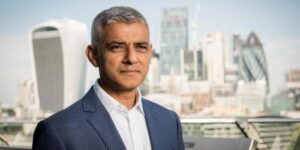Black, Asian and Minority Ethnic Londoners more likely to be affected by the impact of the climate emergency
- New analysis from City Hall shows Black, Asian and Minority Ethnic Londoners are more likely to be affected by the impact of the climate crisis
- Recent research from the Intergovernmental Panel on Climate Change (IPCC) also shows the poorest around the world – predominantly Black and Asian people, who tend to have the smallest carbon footprints – will suffer the most severe consequences
- Sadiq is committed to taking bold action to reduce climate risk in London and to use his leadership of the C40 network to help cities across the Global South
 The Mayor of London, Sadiq Khan, today highlighted data which shows that areas of London with Black, Asian and minority ethnic populations of more than 50 per cent are more likely to face the highest climate risk in London including flooding, exposure to toxic air, heat risk and limited access to green space.
The Mayor of London, Sadiq Khan, today highlighted data which shows that areas of London with Black, Asian and minority ethnic populations of more than 50 per cent are more likely to face the highest climate risk in London including flooding, exposure to toxic air, heat risk and limited access to green space.
Last year, London saw the impact of the climate emergency first-hand with soaring temperatures and flash floods in the capital. City Hall analysis has shown that if the necessary action is not taken and extreme temperatures and flooding continues to get worse, a quarter of London’s rail stations, 1 in 5 schools, nearly half of London’s hospitals and hundreds of thousands of homes and workplaces will be at risk of flooding in the future.
The climate crisis is already having a significant impact on countries with strong links to London’s diaspora communities, including Bangladesh, China, Ghana, India, Jamaica, Nigeria, Pakistan, Somalia and Sri Lanka.
Taking action to tackle the climate emergency will not only benefit London, but other countries around the globe too. While everyone will experience the damaging consequences of the climate crisis, the greatest impacts will be felt disproportionately by those with the fewest resources to cope. The poorest, the elderly, children and women are typically the most exposed.
The UN’s Intergovernmental Panel on Climate Change (IPCC) recently released a report that warned there is only a brief and rapidly closing window to tackle the climate crisis, with a warning of the dire consequences of inaction.
In London, the Mayor has already taken action through the introduction of the world’s first Ultra Low Emission Zone, which has helped reduce pollution in central London by nearly half at the same time as cutting carbon emissions. On 25 October, the zone expanded up to the north and south circular roads, ensuring that almost four million Londoners can breathe cleaner air. The expanded ULEZ is expected to reduce road transport NOx emissions by around 30 per cent.
Sadiq also recently asked TfL to consult on expanding the Ultra Low Emission Zone London-wide in 2023. This follows the publication of a report last month which revealed that in order to meet the target of getting to net-zero in London by 2030, car traffic must reduce by at least 27 per cent in the capital by the end of the decade.
The ULEZ is highly targeted at getting the most polluting vehicles off our streets, and early assessments indicate that making it London-wide would:
- reduce NOx emissions from cars and vans by between 285 and 330 tonnes
- lead to an additional reduction of around 10 per cent NOx in emissions from cars and vans
- reduce CO2 emissions in outer London by between 135,000 to 150,000 tonnes
- And reduce the number of the most polluting cars on London’s roads by between an additional 20,000 and 40,000 a day.
Since 2016, the Mayor has also: planted over 340,000 trees, including two woodlands; introduced over 700 zero-emission buses; committed to making London a zero-carbon city by 2030, faster than any comparable city; developed a climate action plan that is compatible with the highest ambition of the Paris Agreement; provided funding for around £15 million for greening projects; and secured tens of millions of pounds to make homes across London more energy efficient, which will help reduce energy costs and tackle fuel poverty. Through his London Plan, the Mayor has also achieved carbon emission reductions of almost 50 per cent more than set by national building regulations.
As the new chair of C40, an organisation of 97 cities across the globe that represent over 700 million people and a quarter of the global economy, Sadiq has committed to supporting cities around the world to roll out similar bold action to address emissions and air pollution. He has made clear that a just transition, with support for cities in the Global South, is vital – and has already delivered on his key pledge to direct a record two-thirds of the C40 budget towards Global South cities.
The Mayor of London and chair of C40 Cities, Sadiq Khan, said: “The climate emergency is one of the biggest global threats we face today. Here in London we are already experiencing first-hand the impact of the climate crisis, with flash floods in the summer of 2021 and heatwaves in 2020, which led to almost 500 additional deaths.
“We don’t have time to waste. The climate emergency means we only have a small window of opportunity left to help save the planet by reducing carbon emissions.
“This is also a matter of racial justice. The effects of the climate crisis won’t impact all Londoners equally – with the poorest, minority communities and most vulnerable expected to be hit the hardest. Poverty, deprivation and health inequalities will reduce people’s ability to prepare for, respond and recover from overheating and flooding incidents.
“London has a responsibility to act – not only to protect our capital, but to help safeguard the places around that world that we are so fundamentally linked to as a city. That’s why I’m determined to ensure that London continues to lead from the front in tackling air pollution and the climate emergency.”
Mark Watts, Executive Director, C40 Cities said: “‘World cities’ like London are so named because their international populations represent a microcosm of global human civilisation in one place – the wealthier in urban society contributing to climate emergency and the poorest most impacted by it. Leadership in cutting global emissions must start at home and in our cities. Winning support for bold climate action in London will not only benefit diverse communities of vulnerable Londoners but inspire greater climate collaboration between people and nations right across the world. That’s exactly what we need if we are going to halve global emissions in the next 8 years – as we must.”
Syed Ahmed, Chair of Community Energy for London said: “BAME and poorer Londoners are more likely to live in areas which feel the full impact of climate change. This can be as a result of poorer housing, increased pollution or reduced access to green spaces. This is a welcome study highlighting what we see across the globe, that the most vulnerable communities bear the full impact of a changing climate, is also what is experienced in cities such as London and I welcome the Mayor’s action in recognising, and taking action, to address these issues.”
Louise Pryor, London climate change partnership, said: “It’s clear that the impacts of climate change don’t affect us all equally. Both in London and worldwide it is the poorest and most vulnerable who are hardest hit, so it’s good to see London targeting its climate adaptation measures to support our most vulnerable populations and reduce climate inequality.”
—————————————————————————————————————————————
Your help to our media platform will support the delivery of the independent journalism and broadcast the world needs. Support us by making any contribution. Your donation and support allows us to be completely focus, deeply investigative and independent. It also affords us the opportunity to produce more programmes online which is a platform universally utilised.
Thank you.
Please click link to make – DONATION










